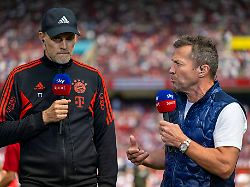Expert explains ongoing trouble
What is behind the trainer alliance against chief critics?
November 24, 2023, 2:58 p.m
The Bundesliga is not letting go of the tense relationship between coaches and TV experts. In the middle: Thomas Tuchel and Steffen Baumgart, who appear to have joined forces against the critics. An expert gives reasons for the dispute and says when the boundaries of good taste are exceeded.
One speaks of “nonsense”, the other of “an absolute impudence”. This Friday, Cologne’s coach Steffen Baumgart and Bayern Munich’s Thomas Tuchel will face each other in the Bundesliga (8:30 p.m./DAZN and in the live ticker on ntv.de) opposite – but what they both have in common is their approach to criticism from TV experts like Dietmar Hamann or Lothar Matthäus. While most coaches have so far dismissed expert statements as unpleasant background noise, Tuchel and Baumgart recently defended themselves publicly.
For media scientist Christoph Bertling from the German Sport University Cologne, these are “communicative protective shields,” as the expert emphasized. At the same time, criticism is part of the “metier,” said Bertling: “You have to have respect for it when things get critical. It can also get louder. The arguments have to be in the foreground.”
However, the fact that coaches can react sensitively, for example like Tuchel did at the expert table on Sky after the win in the top game at Borussia Dortmund (4-0), is also related to the general development of the industry. “You notice that clubs are creating their own communication worlds and they no longer allow this criticism,” said the scientist. This means that the people in the spotlight are “not used to” “putting up with criticism” and therefore quickly feel attacked.
Higher costs, more experts
In the past, clubs only provided information via their homepages, “now we have content marketing machines that work absolutely well,” says Bertling. In this way, “I can communicate the things that are important to me quite well and don’t need journalism.” As a result, journalism can automatically become a small “nuisance”: “Everything that comes from outside is seen as criticism if it doesn’t fit into the illusory world.”
Nevertheless, such friction was part of the business and made it so attractive. Bertling estimated that “80 percent in Germany, if not more,” would have “felt very entertained” during the verbal back and forth between Matthäus and Tuchel in Dortmund.
Due to increasing license fees, broadcasters would like to rely on additional experts for cost reasons alone, and the calculation here is simple. More experts, more opinions, more friction. As long as everyone follows the rules, Bertling doesn’t see any problems. An expert must “be able to classify appropriately,” he said: “Empathy would always be partiality and an expert is not allowed to have that.”
